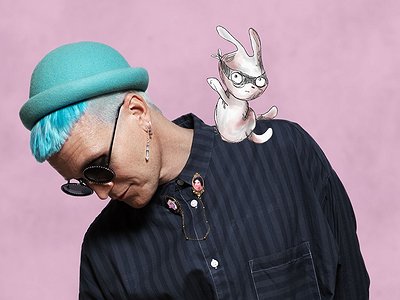Part 2
How do you make use of technology? In terms of the feedback mechanism between technology and creativity, what do humans excel at, what do machines excel at?
I’ve always been fascinated by technology and love to work with computer, synths, effects, plugins, pedals and all kinds of gear. Mixing, editing and processing, experimenting with sounds and ambience, is a very important way to compose music for me. I love to combine traditional instruments with digital technology, and to use electronics and synths as an instrument within an acoustic ensemble. But technology can also be an obstacle. I mean, there’s nothing more frustrating than technology not working. It is a real creativity killer.
Collaborations can take on many forms. What role do they play in your approach and what are your preferred ways of engaging with other creatives, including the artists performing your work?
To compose music can sometimes be very lonely. Therefore, I find it very important to collaborate with musicians when recording my compositions. And I’m fortunate to be able to surround myself with people that are great musicians and composers. It’s also very inspiring to compose for a specific musician who has their own voice.
But, collaborations can be so much more than music. I love to cross boundaries and collaborate with other art forms, such as dance, painting, theatre, film etc, it has taken me to places and moments I never expected to be part of my work.
How is writing the music and having it performed live connected? What do you achieve and draw from each experience personally? How do you see the relationship between improvisation and composition in this regard?
When composing and recording music, it’s a process you can do until you find the result perfect. You can record however many times you like, make layers of instruments and sounds, try new things and explore ideas until finally you have the finished product.
When performing it live, you actually come close to the people listening to it, and hopefully you’ll get feedback. So, if the first process is about the product itself, the latter is more about the effect of the product, the listener and the performer. I love them both.
Time is a variable only seldom discussed within the context of contemporary composition. Can you tell me a bit about your perspective on time in relation to a composition and what role it plays in your work?
I must say I don’t focus that much on time in my work. On my new album, every composition seems to be pretty short, time wise. I guess it’s my kick for pop songs shining through.
How do you see the relationship between the 'sound' aspects of music and the 'composition' aspects? How do you work with sound and timbre to meet certain production ideas and in which way can certain sounds already take on compositional qualities?
Sound and composition works hand-in-hand for me and has an equal part within a production. To identify the different ways a composition can sound and the difference between what the composition can mediate, the simplest way is to listen to a certain song recorded by different artists; suddenly you notice that you prefer one of them. Or maybe you like them both, but in different ways.
I’m always searching for the sound as much as the composition because it’s so important for me. A mighty grand piano might transmit something completely different from the old upright piano in your grandma’s apartment, with the same composition.
Our sense of hearing shares intriguing connections to other senses. From your experience, what are some of the most inspiring overlaps between different senses - and what do they tell us about the way our senses work? What happens to sound at its outermost borders?
Music has always been very tactile for me. I guess it’s because of the obvious reason that I perform music, touch an instrument to produce a sound. The senses always tend to be stronger when they are working together. The simplest way to spot it might be to compare it with food; bad-looking food can taste good, but it tastes better if it smells good, looks good, has a nice texture and sounds great when you’re eating it.
Art can be a purpose in its own right, but it can also directly feed back into everyday life, take on a social and political role and lead to more engagement. Can you describe your approach to art and being an artist?
My political agenda is not obvious in my music, but it’s always there. All the choices I make I do consciously. Gender equality, diversity, LGBTQ+, interculturality and animal rights are subjects I’m engaged in and apply on everything I produce: music, covers, videos, photos, performances etc.
It is remarkable, in a way, that we have arrived in the 21st century with the basic concept of music still intact. Do you have a vision of music, an idea of what music could be beyond its current form?
I think we’re all moving towards more technology together, also with music and performances. Not as in a futuristic movie when everyone is using technology, everywhere, all the time, but in a more a delicate way, where we’re better able to sort out the good from the bad. I think we’ll be better at collaborating internationally and borderlessly online, to perform live and find ”spaces”, ”venues” that are curated like ”live" venues. Obviously, it’s all happening already because of the quarantine, and I think we can expect a massive amount of creative projects online. I hope different art forms will collaborate more and that the acceptance and openness will increase.






